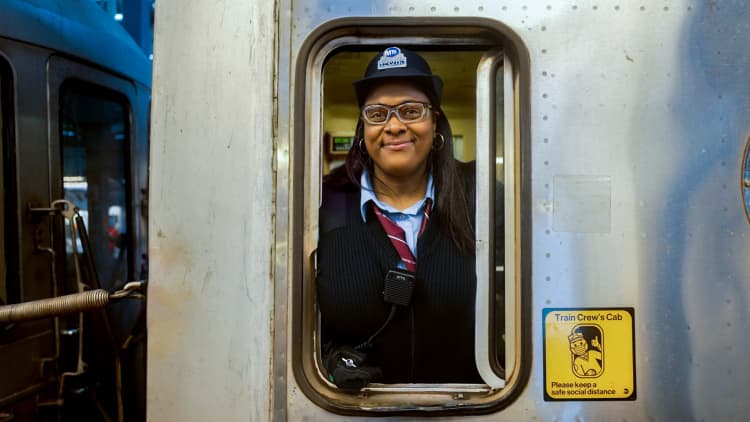Asian American, Native Hawaiian and Pacific Islander women are one of the fastest-growing demographics of entrepreneurs — but the lingering Covid-19 pandemic has exacerbated existing problems for these women and the families who depend on their income.
More than two million businesses in the U.S. are owned by Asian Americans or Pacific Islanders, according to the Asian/Pacific Islander Chamber of Commerce. As of 2020, the most recent year for which federal government data is available, 171,400 businesses were owned by Asian American women and 2,600 by Native Hawaiian and Pacific Islander women.
Yet the number of AAPI business owners is estimated to have decreased by more than a quarter since the start of the pandemic. Some of this decline can be attributed to structural issues that have afflicted other minority entrepreneurs. Many of these businesses are in the industries hardest hit by job losses since the start of the pandemic, including restaurants, retail and personal care services.
What's more, language barriers, as well as a lack of banking relationships, have limited AAPI entrepreneurs' access to loans and capital, Hello Alice, an online platform for small businesses, reported in 2021.
Asian American, Native Hawaiian and Pacific Islander women, in particular, have faced some of the harshest economic effects of the Covid-19 crisis, including "shuttered businesses, significant job losses, increased caregiving responsibilities, and much more," per the Center for American Progress.
Despite the unique challenges this group must deal with, data on Asian American, Native Hawaiian and Pacific Islander women is "limited and fragmented at best," the center added.
April 5 marks AAPI Women's Equal Pay Day, which signifies how far into the year these women must work to catch up to what white men earned the previous year. women working full-time in the U.S. are typically paid $0.92 for every dollar paid to white men, according to the National Women's Law Center.
If the wage gap fails to close, the NWLC estimates that AAPI women working full-time, year-round stand to lose $267,000 over the course of a 40-year career. Entrepreneurship is a valuable pillar for Asian American, Native Hawaiian and Pacific Islander women to build wealth, but they still face challenges getting fair access to capital and other barriers to success.
'Over-mentored and underfunded'
Asian American, Native Hawaiian and Pacific Islander women entrepreneurs have limited access to critical grants, loans and capital, even as the number of businesses they own continues to grow in the U.S.
Of the $800 billion in federal dollars given to small business owners through the federal Paycheck Protection Program during the pandemic, only $7.7 million went to AAPI-owned businesses.
While there are dozens of professional networks to connect these women with mentors, "very few" provide the capital they need to grow and sustain their businesses in the long term, says Gloria Lau, the former CEO of the non-profit YWCA USA.
In 2020, Lau and her co-founder Bella Hughes launched FoundHer, the first small business accelerator for Native Hawaiian, Pacific Islander, and Asian women in Hawaii, which provides non-dilutive grant funds, which means founders don't have to give up shares of their business, and other resources to entrepreneurs in their cohort. So far, FoundHer has awarded $240,000 to 10 companies.
"Women and especially women of color are historically over-mentored and underfunded," says Hughes, who is also an angel investor and entrepreneur. "Very few accelerators and incubators are designed to empower women entrepreneurs holistically."
When it comes to funding, AAPI women face a double whammy, adds Lau. "On one end of the spectrum, they are still combatting the 'model minority' myth, which assumes that they don't need any help," she explains. "On the other end, they also have to combat harmful racial fetishization, and because of that, their professional ambitions aren't always taken seriously."
A looming recession threatens to widen the funding gap, says Sharita Gruberg, vice president for economic justice at the National Partnership for Women and Families.
"We know from past recessions that women of color, including AAPI women, tend to be some of the first to feel the negative effects of job loss and further economic distress, and often the last to recover from big economic changes like a downturn or inflationary pressures," she says. "Unfortunately, we'll likely see a similar pattern in the next recession."
'An impossible decision'
There are millions of Asian American mothers living in multigenerational households who are shouldering the brunt of caregiving "not just for their children, but for elderly parents and extended family members, too," Yvonne Hsu, the chief policy and government affairs officer at The National Asian Pacific American Women's Forum (NAPAWF), said in a statement for AAPI Equal Pay Day.
More often than not, AAPI women are also the breadwinners of their families, she added. To make up for wages lost during the pandemic, "AAPI women have no choice but to work longer hours and multiple jobs which often don't provide paid medical or family leave," Hsu added.
Nearly half of AAPI women live in "child care deserts" in the U.S., places where licensed child-care supply doesn't come close to meeting demand, according to the Center for American Progress.
The pandemic has only worsened America's child-care deserts, leaving many AAPI women entrepreneurs to make "an impossible decision" between running their businesses or caring for their families, Gruberg says.
These caregiving responsibilities are often at odds with the demanding schedule of an entrepreneur says Sung Yeon Choimorrow, executive director of the NAPAWF.
But the AAPI women entrepreneurs she works with aren't fixated on the obstacles in their path. "That's the magic and strength of AAPI women," she says. "We trust in our resilience and, especially after surviving the pandemic, the attitude is, 'Whatever comes next, we can tackle it. We'll figure it out.'"
DON'T MISS: Want to be smarter and more successful with your money, work & life? Sign up for our new newsletter!
Take this survey and tell us how you want to take your money and career to the next level.
Check out:



